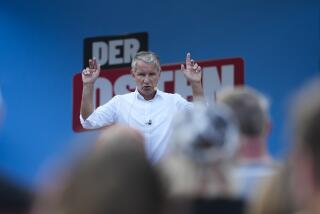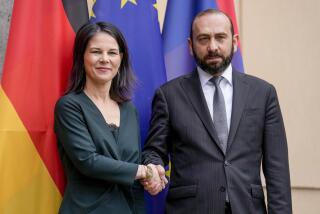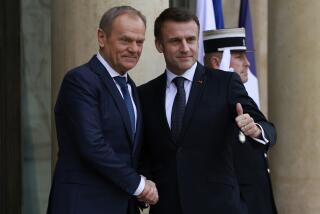The 2 Germanys Meet in First Step to Unity : Europe: Talks launch the creation of a potential mini-superpower. Other nations watch nervously.
EAST BERLIN — Surrounded by worried neighbors, the two Germanys on Friday began their historic journey toward reunification.
The first step was modest, a 2 1/2-hour preparatory meeting between an East German deputy foreign minister and two senior Bonn officials on the security aspects of German unity at an East Berlin guest house.
There were no personalities, no news conference and little information.
But it launched a process that is certain to alter the political landscape of central Europe and one that will create what many expect to become a mini-superpower.
Friday’s talks, which reportedly dealt mainly with the external implications of German unity, were conducted in advance of a meeting next week in Bonn that will bring together representatives of both Germanys and the four victorious World War II powers for the first formal talks on the sensitive issue.
The so-called two plus four formula for the talks was agreed upon last month in Ottawa between members of both the Warsaw Pact and the North Atlantic Treaty Organization. It calls for the two Germanys to develop a framework for their unity, but work toward joint agreement on all external questions with the United States, France, Britain and the Soviet Union, the powers that occupied the defeated Third Reich at the end of World War II.
Despite the passage of nearly 45 years, there has never been a peace treaty formally concluding the war in Europe.
“These talks dealt mainly with procedural questions,” said Dieter Kastrup, head of the West German Foreign Ministry’s political directorate after the East Berlin talks.
Substantive negotiations on unity are scheduled to begin only after East Germans elect a democratic government next Sunday in what will be the area’s first genuinely free elections since 1932, the year before Nazi dictator Adolf Hitler seized power.
East German Deputy Foreign Minister Ernst Krabatsch described the process as filled with “very complex questions.”
While both sides declined to discuss details of the meeting, Krabatsch, who headed the East German delegation, referred to the increased concern in Europe about the unification process.
“The security interest of others must be considered,” he said.
Germany’s European neighbors, mildly irritated at being omitted from the “two plus four” formula, have shown signs of genuine alarm in recent days after West German Chancellor Helmut Kohl repeatedly refused to reaffirm clearly the sanctity of Poland’s western border with East Germany.
That frontier, which runs along the Oder and Neisse rivers, was fixed in the wake of World War II and transferred about 44,000 square miles of German territory to Poland.
Under international law, only a united Germany can agree to such a treaty. However, Kohl’s evasive responses on the border issue followed by his attempt to link it to a demand that Poland renounce World War II-related reparations angered Polish leaders, who remain unsatisfied despite the chancellor’s subsequent backdown.
On Friday, Polish President Wojciech Jaruzelski won the backing of French President Francois Mitterrand for his demand that Poland be represented during any of the “two plus four” sessions that relate directly to the border question.
Mitterrand, regarded as one of Kohl’s closest foreign allies, declared that the sanctity of the Oder-Neisse frontier should be guaranteed by an internationally recognized treaty.
While Mitterrand’s statement is technically not in conflict with Kohl’s own legally based argument on the issue, television pictures of the French president flanked by Jaruzelski and Polish Prime Minister Tadeusz Mazowiecki--aired on Friday evening’s main West German national news--left Germans in little doubt about the extent of international concern over reunification that has surfaced in recent days.
Meanwhile, in Bonn, officials tried to dampen fears of those worried about the speed of possible unity.
Deputy government spokesman Dieter Vogel told reporters that both Kohl and Foreign Minister Hans-Dietrich Genscher agreed that German unity could only take place on the basis of “careful and extensive consultations” between both German states and their partners and neighbors.
Kohl has advocated unity as fast as possible via a provision of the West German constitution that would permit the de facto annexation of East Germany. Vogel stressed that, even if this provision is used as the vehicle to unity, there would be careful deliberations.
Kohl delivered a similar message at a meeting with his NATO partners in Brussels on Thursday.
“Nothing agreed by the two German governments after March 18 will be done behind the backs or against the interests of other states,” he said.
Vogel said that such key issues as a united Germany’s membership in the Western Alliance would be worked out before unification. Genscher, the junior partner in Kohl’s government coalition, flew to Copenhagen on Friday for talks with his Danish counterpart, Uffe Ellemann-Jensen. Afterward, a joint statement declared:
“We fully support the German unification process and have been very satisfied that this is to take place within the broader European framework.”
Genscher also sought to reassure the Danes on the border question. The joint statement said: “It is of special importance to emphasize that the right of the Polish people to live within secure borders will not be questioned either now or in the future.”
Ellemann-Jensen added that the Polish question “should never have been allowed to become a problem.”
In another sign of the growing ties between the two Germanys, the West German Transport Ministry said the United States, Britain and France had agreed to end a ban on direct inter-German flights by German planes. The three powers agreed to a request from Bonn to open an air corridor for regular direct flights between West German cities and Dresden, Leipzig and Erfurt in the East.
Airspace over the border had been off-limits since 1945 except for three corridors linking West Germany to West Berlin for the use of allied French, British and U.S. airlines.
BACKGROUND
East Germany’s 12 million voters will choose from 24 parties and groups when they hold democratic parliamentary elections on March 18. The vote will clear the way for substantive negotiations on reunification. The lineup will include the disgraced Communists and their four former satellite parties, which have re-established their independence. Strongest among the remaining 19 opposition groups are the moderate-left Social Democrats and a three-party conservative alliance led by the Christian Democrats. Other groups include the Greens, the Independent Women’s Assn., three vanguard opposition movements--New Forum, Democracy Now and the Peace and Human Rights Initiative--and the German Beer Drinkers Union.
Times staff writer William Tuohy, in Bonn, contributed to this report.
More to Read
Sign up for Essential California
The most important California stories and recommendations in your inbox every morning.
You may occasionally receive promotional content from the Los Angeles Times.










